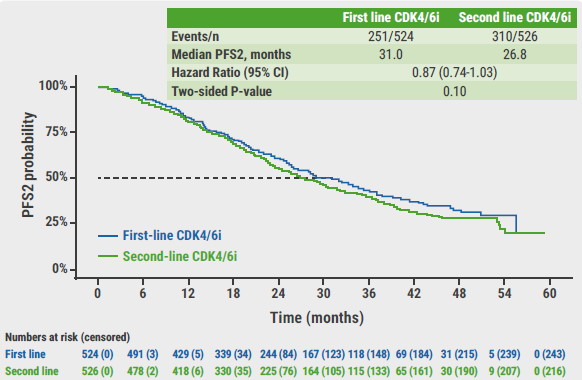"These results provide clinical validation of CTC monitoring as an early treatment response marker in advanced breast cancer and suggest the potential for clinical utility," Dr. Wolfgang Janni of Ulm University Hospital, in Germany, said during a press briefing at the 2020 San Antonio Breast Cancer Symposium, where the findings were presented.
The results are based on pooled data for more than 4,000 women with metastatic breast cancer who had baseline and follow-up CTC assessments using the U.S. Food and Drug Administration (FDA)-approved CellSearch CTC test. The median time from baseline to follow-up testing was 29 days.
Changes in CTC dynamics between baseline and follow-up were associated with overall survival, Dr. Janni reported.
Of the 2,961 women who were CTC-positive at baseline, 1,855 remained CTC-positive after starting treatment (positive/positive), while 1,106 converted to CTC-negative (positive/negative). Of the 1,118 women who were CTC-negative at baseline, 813 remained negative (negative/negative), while 305 converted to positive (negative/positive).
Median overall survival was highest in the negative/negative group (47 months), followed by the positive/negative group (32 months), negative/positive (30 months), and positive/positive (18 months).
Compared with women who were negative/negative, the risk of dying was 215% greater for those who were positive/positive, 74% greater for those who were negative/positive, and 52% greater for the positive/negative women.
For women who were CTC-positive at baseline, those who remained CTC-positive at follow-up had a 51% greater risk of death than those who converted to CTC-negative.
Similar trends were found when CTC dynamics were analyzed by breast cancer subtype, including for hormone receptor-positive, HER2-positive, and triple-negative tumors.
"These data indicate that CTC dynamics can predict the trajectory of the disease a little more than four weeks after initiating treatment. It is also very reassuring that CTC dynamics predicted outcomes for all breast cancer subtypes," Dr. Janni said in a news release.
Briefing moderator Dr. Carlos Arteaga of UT Southwestern Medical Center, in Dallas, said, "This is a very large pooled analysis that really instructs us on a noninvasive approach that may provide an advantage over conventional imaging methods that can take up to three months before changes can be detected in breast tumor tissue."
The study was supported by Menarini Silicon Biosystems, which makes the Cell Search CTC test used in the study. Dr. Janni received a research grant from the company.
SOURCE: https://bit.ly/3nm4D7e 2020 San Antonio Breast Cancer Symposium, presented December 9, 2020.
By Megan Brooks
Posted on
Previous Article
« CheckMate 9ER offers RCC new frontline option; perspectives from the study’s principle investigator Next Article
Worse AMI outcomes for lupus, systemic sclerosis patients »
« CheckMate 9ER offers RCC new frontline option; perspectives from the study’s principle investigator Next Article
Worse AMI outcomes for lupus, systemic sclerosis patients »
Related Articles
November 18, 2020
Breast density helps predict cancer-related lymphedema risk
October 12, 2021
Breast cancer patients often use cannabis and don’t tell physicians

© 2024 Medicom Medical Publishers. All rights reserved. Terms and Conditions | Privacy Policy
HEAD OFFICE
Laarderhoogtweg 25
1101 EB Amsterdam
The Netherlands
T: +31 85 4012 560
E: publishers@medicom-publishers.com

